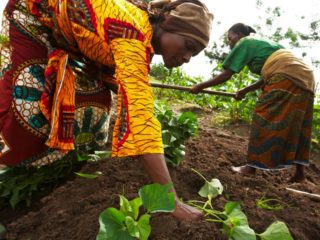Olam’s ‘one-stop tech platform’ improves yield, traceability for 100,000 farmers
Olam International has updated
the Olam Farmer Information System (OFIS), giving 100,000 smallholder farmers
access to detailed information about their farms.
Each farm has been mapped and
surveyed with an Android app. The collected data offers tailored support to
smallholders and more precise details to customers making critical choices
about financial interventions, such as agri-training, school or healthcare
infrastructure.
OFIS Director Simon Brayn-Smith
emphasizes the platform’s capability in helping all participants in the supply
chain.
“You have to remember that while
big data usage is commonplace among large-scale farms, our field officers are
working in some of the world’s most isolated places,” he says. “With the OFIS
technology they have been able to survey and record, on the spot, thousands of
farms, the surrounding landscape, as well as the farmer’s social circumstances.
This gives the farmers, Olam and our customers greater insight to tackle issues
from poor yields to climate change and child labor. And by ‘GeoTagging’ each
bag of produce we can trace it from farm to fork, providing assurance to end
users on product provenance.”
The OFIS platform has been
designed to build capacity from the ground up and allows farmer groups and
cooperatives to manage stock levels and keep an eye on creditor and debtor
positions, the company says. It also gives them detailed reports about their
business activities, including a way to prove provenance of a product, which in
turn, helps them access traceability premiums.
As part of Olam’s sustainability
interventions under the Olam Livelihood Charter, which supports 300,000
farmers, OFIS can now give personalized farm development plans to each farmer with
advice on how to make the most of each plot and crop.
More than 10,000 customized plans
have been generated for cocoa farmers. This advice, such as when and how to
prune based on the exact age of the trees, can be texted straight to the
farmer’s mobile phone. Having a plan empowers the farmer, while progress
against recommendations can be tracked over time and adapted where necessary.
They can also receive payments for their crops into a ‘mobile wallet,” allowing
for the creation of credit histories for farmers.
In addition, Olam field staff and
implementing partners can keep track of farmer training progress and program
targets. Crosscutting and comparing extensive data sets enables staff to
understand more easily why one farmer group, or even an individual farmer, may
be getting lower yields than others in the same region. This enables more
efficient use of resources, helping to achieve scale.
Currently OFIS is being rolled
out across Olam’s cashew, cocoa, coffee, hazelnuts, palm, pepper, rice and
rubber supply chains, with a goal to reach 500,000 farmers by 2020.




Comments
Post a Comment